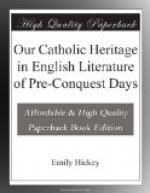The story of Judith is a well-known one; the story of the Hebrew lady who is described in the foreword to the Book of Judith as “that illustrous woman, by whose virtue and fortitude, and armed with prayer, the children of Israel were preserved from the destruction threatened them by Holofernes and his great army.”
The earlier part of the poem is lost, so we can only guess how the poet told of the ravage wrought by the general of King Nabuchodonoser in the countries close to Palestine, and how submission was as vain as resistance to a power which, for the time being, was allowed to be so terribly great.
The poem, as we have it, begins where Judith has come, in the splendour of her beauty, and the might of her purity, and the power of her faith, to destroy the destroyer and set her people free.
The Prince of Glory gave her
the shield of His hand in the place
Where she stood in her uttermost
need of the highest Doomer’s grace
To save her in peril extreme;
and the Ruler of all things made,
The glorious Father in Heaven,
He granted the prayer she prayed,
And, because of the might
of her faith, He gave His help and His aid.
I have heard how his word
went forth, how Holofernes bad
His men to the drinking of
wine, and the splendid feast he had.
The prince he called his thanes
and the shielded warriors best,
And the folk-leaders came
to the mighty, all fain for the doing his best.
And now, since the coming
of Judith, three days and three nights had been,
The woman wise in her heart,
and fair as the elf-folk sheen.
We have the description of the banquet, with the deep bowls and well-filled cups and pitchers borne to the sitters along the floor—just the description of the old Saxon banquet which the poet knew of. We have the drunken glee of Holofernes, his right noisy laughter and the stormy mirth that could be heard from afar; and his call to the henchmen to quit them as warriors ought, till at last they lie in their drunken sleep, powerless, and as though stricken of death.
Then comes the night, and the sending for Judith, the wise-hearted one, to Holofernes’ tent. Holofernes lies in his drunken sleep, and the Lord’s handmaid draws from the sheath the keen-edged glittering sword, and prays,
O God of all created, I pray
my prayer to Thee!
O Spirit of Comfort!
O Son Almighty! I bow my knee,
For Thy mercy to me who need
Thee, most glorious Trinity!
Now is my heart waxed hot,
exceeding hot in me,
And my soul afflicted sore,
and sorrowful grievously.
Give victory, Prince of Heaven,
to me, and steadfast faith,
That so with this sword I
slay this dealer of wrong and death.
O, grant me Thy salvation,
most mighty Folk-prince, Thou,
For ne’er have I needed
Thy mercy with greater need than now.
Avenge, O mighty Lord, the
thing whereof I wot,
Which is anger in my soul,
and in my breast burns hot.
Then the Judge most high He
gave her the courage she prayed Him for,
As yet to each He giveth,
who seeketh Him, as of yore,
With faith and understanding,
his help for evermore.




